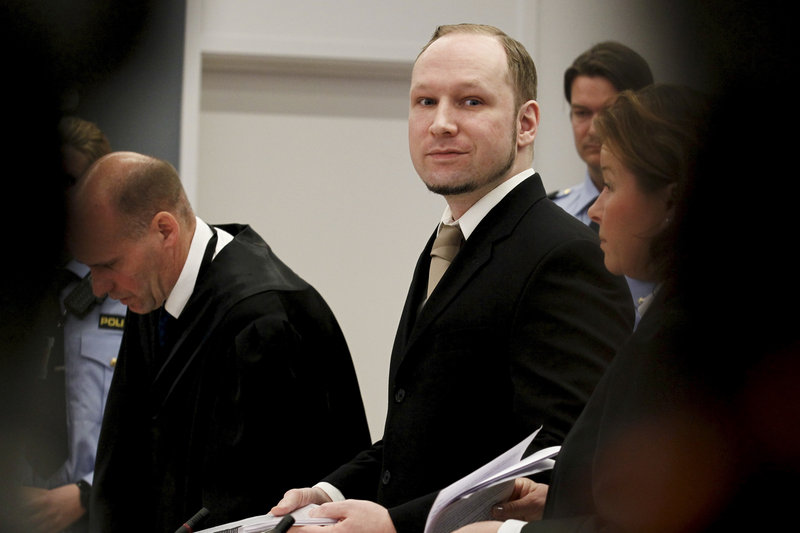OSLO, Norway — In a scene unimaginable in many countries, Norway’s worst mass killer got the chance to explain his fanatical views to the court and the world, unrepentant and dressed in a business suit. Prosecutors and lawyers for the families of his 77 victims even shook his hand.
Two days into Anders Behring Breivik’s terror trial, the way Norway’s legal system deals with a confessed killer who rejects its authority is baffling – even to some Norwegians.
The far-right militant gave a rambling hour-long address to the court Tuesday, reading from a statement that essentially summarized the 1,500-page anti-Islamic manifesto he posted online before his bomb-and-shooting rampage nine months ago.
“The attacks on July 22 were a preventive strike. I acted in self-defense on behalf of my people, my city, my country,” the 33-year-old Breivik declared, demanding to be found innocent of terror and murder charges. “I would have done it again.”
Breivik has five days to explain why he detonated a bomb outside government headquarters in Oslo, killing eight people, then drove to a nearby resort island, where he massacred 69 others, mostly teens, at a summer youth camp run by the governing Labor Party.
Breivik, who has admitted carrying out the grisly acts, boasted they were the most “spectacular” by a nationalist militant since World War II.
His victims were part of a conspiracy to “deconstruct” Norway’s cultural identity, he said. Comparing the Labor Party youth wing to the Hitler Youth, he called their annual summer gathering an “indoctrination” camp.
Breivik also lashed out at Norwegian and European governments for embracing immigration and multiculturalism, and claimed to be speaking as a commander of an anti-Islam militant group he called the Knights Templar – a group that prosecutors say does not exist.
At one point, Breivik even likened his attacks to the U.S. dropping atomic bombs on Japan to bring World War II to an end. “They did it for something good: to prevent further war,” Breivik said.
The court’s main judge interrupted repeatedly, admonishing Breivik to get to the point, but let him continue after he threatened to quit addressing the court altogether if he wasn’t allowed to deliver his entire speech.
“It is critically important that I can explain the reason and the motive” for the massacre, he said.
Mette Yvonne Larsen, a lawyer representing victims’ families, also interrupted Breivik, saying she had received complaints from victims that the defendant was turning the trial into a platform for his extremist views. But even she showed some sympathy for Breivik’s right to explain his actions.
“We understand that the court allows it, but we felt it was our duty as lawyers for the bereaved to intervene,” Larsen told reporters.
Norwegian legal experts said it was important that the country’s legal traditions apply to everyone, even Breivik, whose massacre shocked this prosperous, peaceful nation.
The justice system isn’t about “revenge, but sober, dignified treatment” for everyone accused of a crime, said Thomas Mathiesen, a professor of sociology of law at the University of Oslo.
“It is deeply ingrained in Norwegian tradition and fundamental values. If it lasts all the way through the 10 weeks of this trial, and I think it will, we have an important message to the world,” he said.
In his testimony Tuesday, Breivik rejected suggestions that he has a narcissistic personality disorder.
“July 22, wasn’t about me. July 22 was a suicide attack. I wasn’t expecting to survive that day,” he said. “A narcissist would never have given his life for anyone or anything.”
Send questions/comments to the editors.



Success. Please wait for the page to reload. If the page does not reload within 5 seconds, please refresh the page.
Enter your email and password to access comments.
Hi, to comment on stories you must . This profile is in addition to your subscription and website login.
Already have a commenting profile? .
Invalid username/password.
Please check your email to confirm and complete your registration.
Only subscribers are eligible to post comments. Please subscribe or login first for digital access. Here’s why.
Use the form below to reset your password. When you've submitted your account email, we will send an email with a reset code.